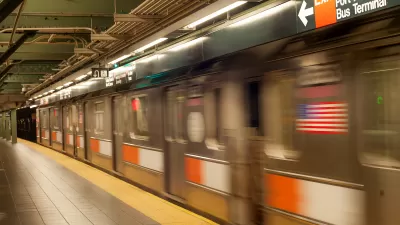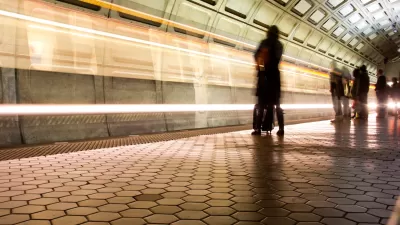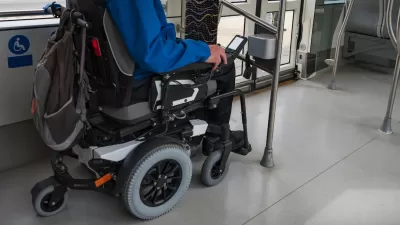Another recent ruling is forcing the agency to accelerate its efforts to make all New York subway stations accessible to people with disabilities and mobility issues.

In a long-overdue victory for people with disabilities, a federal judge ruled that New York City’s Metropolitan Transportation Authority (MTA) must equip 95 percent of its rail stations with elevators or ramps, reports Jose Martinez in The City.
“The MTA announced the settlement last June — agreeing to install elevators or ramps by 2055 at the more than 300 stations that are currently inaccessible to wheelchair users and others with mobility impairments — but it wasn’t made official until Friday.” Today, roughly one quarter of the system’s 500 stations are in compliance with the Americans with Disabilities Act (ADA), notes Martinez.
The settlement includes a requirement to meet certain milestones along the way to full compliance in 2055, such as a requirement that “15% of New York City Transit’s portion of future capital plan funding must now be set aside for accessibility upgrades.”
Since the passage of ADA in 1990, cities and agencies have lagged in bringing public transit facilities and the public right-of-way into compliance. Another federal lawsuit accuses the MTA of neglecting to properly maintain the elevators that do exist at stations. Last December, the agency released a plan detailing designs for elevators and other accessibility upgrades at some of its stations, funded in part by private developers.
FULL STORY: Judge Approves MTA Deal to Make Subways 95% ADA-Compliant by 2055

Planetizen Federal Action Tracker
A weekly monitor of how Trump’s orders and actions are impacting planners and planning in America.

Congressman Proposes Bill to Rename DC Metro “Trump Train”
The Make Autorail Great Again Act would withhold federal funding to the system until the Washington Metropolitan Area Transit Authority (WMATA), rebrands as the Washington Metropolitan Authority for Greater Access (WMAGA).

The Simple Legislative Tool Transforming Vacant Downtowns
In California, Michigan and Georgia, an easy win is bringing dollars — and delight — back to city centers.

The States Losing Rural Delivery Rooms at an Alarming Pace
In some states, as few as 9% of rural hospitals still deliver babies. As a result, rising pre-term births, no adequate pre-term care and harrowing close calls are a growing reality.

The Small South Asian Republic Going all in on EVs
Thanks to one simple policy change less than five years ago, 65% of new cars in this Himalayan country are now electric.

DC Backpedals on Bike Lane Protection, Swaps Barriers for Paint
Citing aesthetic concerns, the city is removing the concrete barriers and flexposts that once separated Arizona Avenue cyclists from motor vehicles.
Urban Design for Planners 1: Software Tools
This six-course series explores essential urban design concepts using open source software and equips planners with the tools they need to participate fully in the urban design process.
Planning for Universal Design
Learn the tools for implementing Universal Design in planning regulations.
Smith Gee Studio
City of Charlotte
City of Camden Redevelopment Agency
City of Astoria
Transportation Research & Education Center (TREC) at Portland State University
US High Speed Rail Association
City of Camden Redevelopment Agency
Municipality of Princeton (NJ)





























